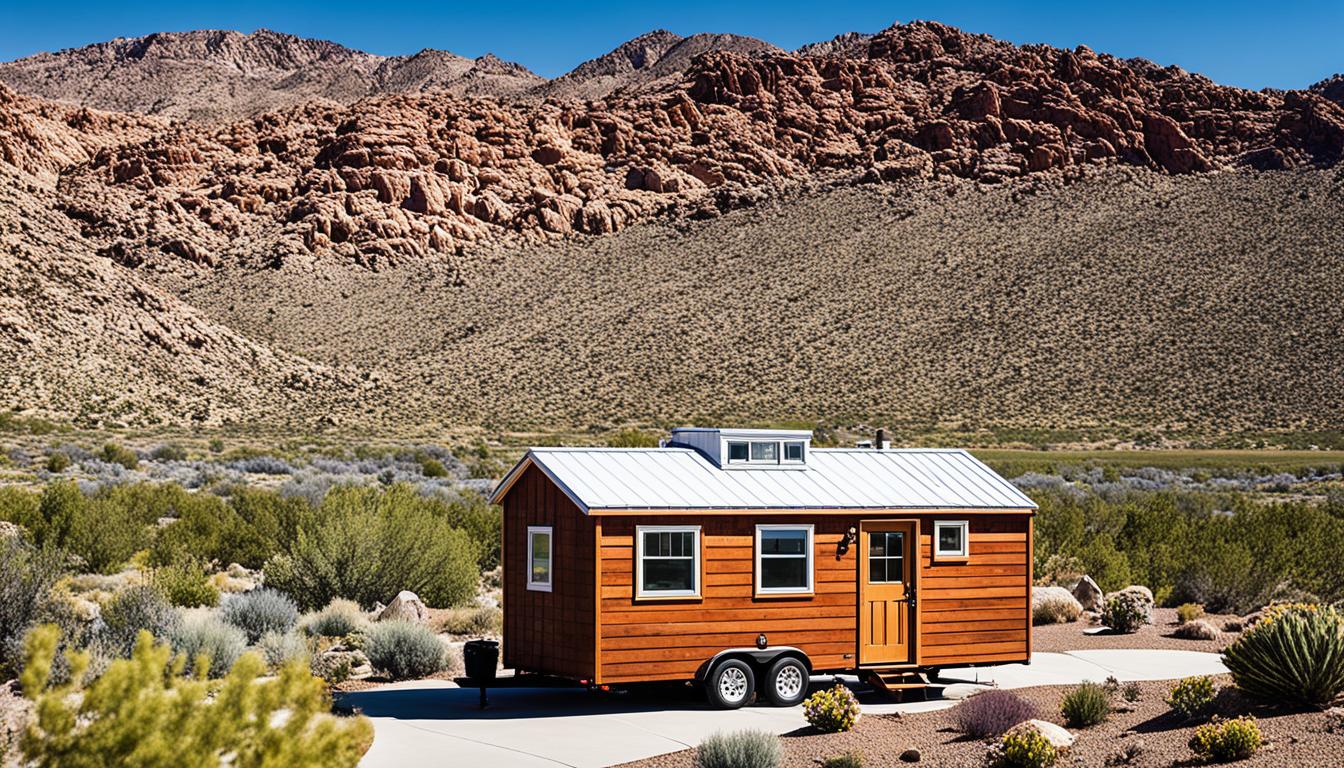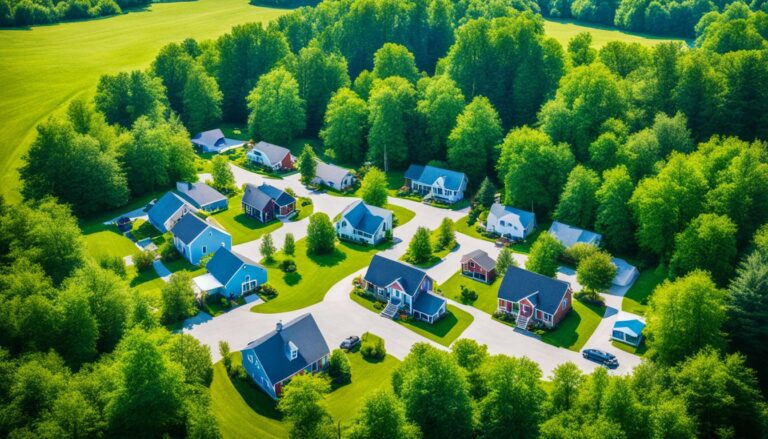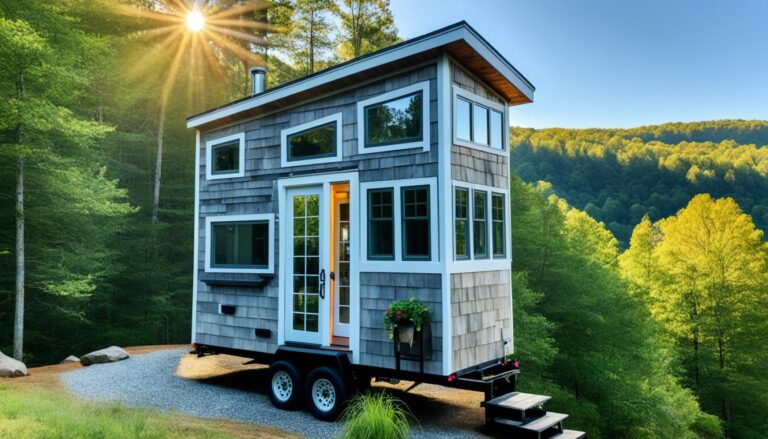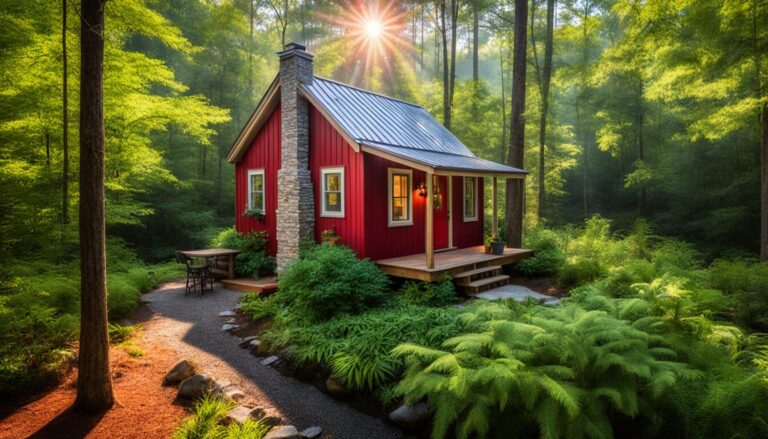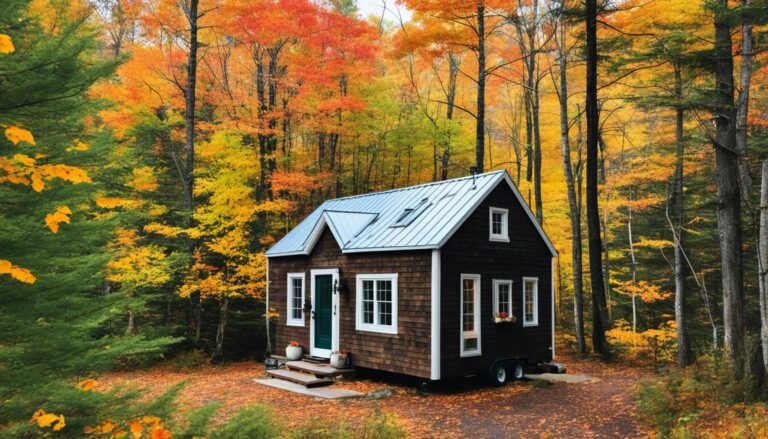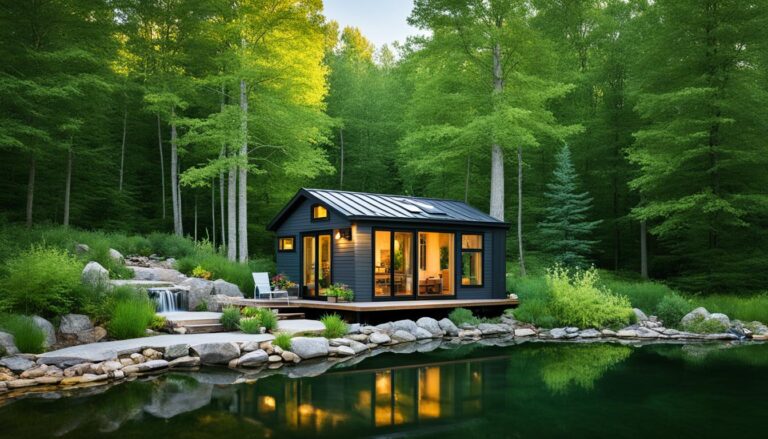Tiny House Placements in Nevada – Find Locations!
Did you know that Nevada has specific regulations and ordinances for the construction and placement of tiny houses? Each county in Nevada has its own rules and regulations, making it essential to do thorough research before settling on a location.
If you’re wondering where you can put a tiny house in Nevada or looking for the best locations for tiny houses in the state, this article has got you covered. From tiny house communities to RV parks and private properties, there are numerous options available.
Key Takeaways
- Nevada has specific regulations and ordinances for the construction and placement of tiny houses.
- Each county in Nevada has its own rules and regulations, so research your preferred county carefully.
- Tiny house communities, RV parks, national parks, and private properties are popular locations for placing a tiny house in Nevada.
- Working with a reputable builder who understands the local codes and regulations is recommended.
- Living in a tiny house offers benefits such as downsizing, affordability, and a sense of community.
Tiny House Zoning Laws in Nevada
When it comes to tiny houses in Nevada, it’s essential to understand the zoning laws in each county. Each county has its own regulations governing the placement and construction of tiny houses. One important piece of legislation to note is SB150, which requires towns to modify their zoning rules to include small dwellings by 2024.
Under Nevada’s zoning regulations, tiny houses can be placed in various ways. They can serve as accessory dwelling units, which are secondary dwellings on the same property as the main house. Alternatively, they can be categorized as single-family residential units, provided they meet the size requirements set by the International Residential Code. Another option is to place tiny houses within designated tiny house parks.
It’s important to note that Clark County, which includes popular areas such as Las Vegas, has its own unique set of construction codes. In Clark County, structures with a kitchen or cooking facilities cannot be considered accessory housing units. Therefore, anyone planning to build a tiny house with a kitchen in Clark County should familiarize themselves with the county’s specific regulations to ensure compliance.
Understanding Local Zoning Ordinances
Before embarking on a tiny house journey in Nevada, it’s crucial to research and understand the zoning ordinances specific to the county where you plan to build. Zoning laws regulate land use and determine where and how different types of structures can be built. This includes specifying the permitted uses of land and the types of structures allowed in each zone.
By familiarizing yourself with the zoning laws, you can ensure that you comply with all requirements and avoid any legal issues. Consulting with local zoning authorities or hiring a professional who specializes in tiny house zoning laws can provide further guidance and ensure you are on the right track.
Complying with Construction Codes
In addition to zoning laws, it’s essential to comply with construction codes when building a tiny house in Nevada. Clark County, for instance, has its own construction codes that govern matters such as electrical, plumbing, and structural requirements.
Meeting these codes ensures that your tiny house is safe and structurally sound. Working with a reputable builder who understands the applicable codes and regulations is highly recommended to ensure your tiny house meets all the necessary requirements.
Tiny House Communities in Nevada
Nevada is a state that offers a range of options for tiny house living. If you’re looking for a unique and close-knit community experience, you’ll be glad to know that there are several tiny house communities right here in Nevada. These communities provide a fantastic opportunity for like-minded individuals to come together, interact, and build connections.
Among the notable tiny house communities in Nevada are Llamalopolis Village and Dancing River Community. These communities are designed to foster a sense of camaraderie and shared experiences. Living in a tiny house community offers more than just a place to live; it provides a support network and a chance to be part of a greater community.
One of the benefits of tiny house communities is the presence of shared spaces and amenities. Many communities have community gardens where residents can grow their own produce and enjoy the outdoors. There are also shared kitchens and recreational areas that provide opportunities for residents to come together and engage in social activities.
Tiny house communities offer an alternative and affordable housing option in Nevada. They provide a way to live sustainably and reduce your carbon footprint while enjoying the benefits of a supportive and connected community.
If you’re looking to embrace the tiny house lifestyle and be part of a community, the tiny house communities in Nevada offer an ideal solution. Not only will you have the freedom to live simply and affordably, but you’ll also have the opportunity to form lifelong connections with like-minded individuals.
Tiny House Building and Design Considerations
When building a tiny house in Nevada, it’s crucial to consider the local building codes and regulations. The Nevada tiny house building regulations outline the guidelines for constructing a tiny house in compliance with state laws. To ensure a successful and legal project, it is recommended to work with a reputable tiny house builder who understands these requirements.
One of the key aspects to consider is proper insulation. Nevada experiences a range of temperatures, and effective insulation is essential for maintaining a comfortable interior climate. By insulating the walls, floors, and roof, you can create a well-insulated tiny house that is energy-efficient and comfortable throughout the year.
Another important consideration is establishing a strong foundation. Nevada tiny house construction relies on a solid base to ensure stability and longevity. Depending on your preferences and site conditions, you may choose between different foundation options such as concrete slab, pier and beam, or trailer-mounted. Discussing the best foundation option with your builder is vital for a safe and secure structure.
Prefabricated tiny homes are a popular choice for many individuals considering tiny house construction in Nevada. These homes are constructed off-site and then transported to the desired location. Prefab houses offer various advantages, including efficient construction and the ability to customize the design to meet your needs and preferences.
Before starting the construction process, it’s essential to obtain any necessary permits and approvals. This ensures that your tiny house complies with the state’s housing regulations and meets the safety standards set forth by the authorities.
By keeping these considerations in mind and working with professionals who understand the nuances of tiny house construction in Nevada, you can create a well-built, comfortable, and compliant tiny home that perfectly suits your lifestyle.
Tiny House Living as a Permanent Residence in Nevada
Living in a tiny house in Nevada can be a long-term and permanent housing solution, provided that you comply with local laws and regulations. To ensure your tiny house meets all the necessary requirements, I recommend contacting the zoning and local authorities in your area. They can provide you with specific guidelines and information regarding the size requirements for the living space, which are often based on the number of occupants.
While Nevada has not yet passed Appendix Q for tiny houses, it is still important to follow the state’s conventional housing regulations when building a tiny house on a foundation. This will ensure that your tiny house is built to code and meets the necessary safety standards. By adhering to these regulations, you can live comfortably and legally in your tiny house as a permanent residence in Nevada.
Benefits of Tiny Living in Nevada
Living in a tiny house in Nevada offers numerous advantages. From downsizing and reducing environmental impact to affordability and customization options, there are plenty of reasons why the tiny house lifestyle is gaining popularity.
One of the main advantages of tiny living in Nevada is the ability to downsize. By embracing a minimalist lifestyle, you can simplify your belongings and live a clutter-free life. This not only helps in optimizing living space but also reduces the need for excess material possessions.
Tiny houses are also incredibly affordable compared to traditional homes. With lower construction costs and minimal maintenance requirements, you can save a significant amount of money in the long run. Additionally, many tiny house owners find that their utility bills and overall cost of living are significantly reduced.
Customizability is another wonderful aspect of tiny living in Nevada. Despite their small size, tiny houses are designed to maximize space efficiency. This allows you to personalize your living space according to your preferences and needs. Whether you want a cozy reading nook, a functional workspace, or a versatile storage solution, you can make it happen in your tiny home.
For outdoor enthusiasts, tiny houses provide the perfect opportunity to embrace outdoor living. Their compact size allows them to be easily transported to various scenic locations in Nevada. You can wake up to breathtaking mountain views, explore national parks, and enjoy nature right outside your doorstep.
Benefits of Tiny House Communities in Nevada
Living in a tiny house community in Nevada offers additional advantages. These communities promote sustainability and eco-friendly practices, creating a welcoming environment for like-minded individuals. From shared resources like community gardens and kitchens to collaborative projects, tiny house communities foster a stronger sense of community and provide opportunities for socialization and collaboration.
Overall, embracing the tiny house lifestyle in Nevada offers a multitude of benefits. Whether you prioritize affordability, environmental consciousness, or a stronger sense of community, tiny living can provide the lifestyle you desire.
Zoning and Legal Considerations for Tiny Homes in Nevada
When it comes to building and living in a tiny home in Nevada, it’s crucial to understand the zoning and legal considerations. Nevada has enacted Ordinance SB150-N Act, which requires county or city governing bodies to approve tiny homes in specific zoning districts. This means that before you start building or placing your tiny home, you need to ensure that it complies with the regulations set forth by the local authorities.
It’s important to note that different regulations may apply depending on whether your tiny home is on a foundation or on wheels. Before making any decisions or plans, thoroughly research the building codes and regulations specific to the county or city where you intend to build your tiny home. This will help you avoid any potential legal issues and ensure that your tiny home project is in compliance with the law.
For more information on the zoning and legal considerations for tiny homes in Nevada, you can refer to Ordinance SB150-N Act. This document provides detailed information on the regulations and requirements that need to be met when building or placing tiny homes in Nevada. Familiarizing yourself with this document will help you navigate the legal landscape and ensure a smooth and legal process for establishing your tiny home in Nevada.
By understanding and adhering to the zoning and legal considerations, you can confidently build and live in your tiny home in Nevada, knowing that your project is compliant with the local regulations.
Tiny Home Regulations in Key Nevada counties
When considering building a tiny home in Nevada, it’s important to be aware that each county has its own regulations in place. While tiny homes are generally permitted in the state, there may be specific rules and restrictions that vary from county to county. It’s crucial to research and familiarize yourself with the regulations of the county where you plan to build your tiny home.
For instance, Clark County, which includes Las Vegas, does not have specific ordinances for tiny homes. However, it does have its own construction codes that must be followed during the building process. These codes apply to structures over 200 square feet and require a building permit. By adhering to these regulations, you can ensure that your tiny home meets the necessary construction standards.
To avoid any issues, it’s advisable to thoroughly research the regulations of the county where you plan to build your tiny home. This will help you navigate through any specific requirements, such as permits or construction codes, ensuring that your tiny home is compliant with local regulations.
Having a clear understanding of the regulations in your chosen county will help you avoid any legal complications and ensure a smooth and successful building process. By following the guidelines set by each county, you can confidently embark on your tiny home journey in Nevada.
Tiny Home Communities in Nevada
Nevada is home to various tiny home communities that offer unique living experiences and a range of amenities. These communities provide an opportunity for individuals to embrace the tiny house lifestyle and foster a stronger sense of community. One popular community in Nevada is Tiny Town Estates, located near Las Vegas. It offers resort-style living with beautiful surroundings and a diverse range of facilities.
Many tiny home communities in Nevada prioritize sustainability and eco-friendly practices. These communities often utilize solar power, rainwater harvesting systems, and other green technologies to minimize their environmental impact. Living in a sustainable tiny home community allows residents to maintain a minimalist lifestyle while enjoying the benefits of a close-knit community.
If you’re interested in exploring more about tiny home communities in Nevada, I recommend reading this fascinating article at Nevada Appeal. It provides valuable insights into Lyon County’s approval of code amendments for tiny houses, which can positively impact the growth of tiny home communities in the region. This information is crucial for individuals looking to join or establish a tiny home community in Nevada.
Building and Design Considerations for Tiny Homes in Nevada
When building a tiny home in Nevada, it’s important to adhere to the building codes and regulations specific to the state. Working with a reputable tiny home builder who has a thorough understanding of these requirements is highly recommended. Proper insulation, a strong foundation, and efficient use of space are essential considerations for the design and construction of tiny homes in Nevada.
One crucial aspect of building a tiny home in Nevada is ensuring that it meets the state’s building codes and regulations. These regulations are in place to ensure the safety and structural integrity of the homes. By following these guidelines, you can avoid potential issues and complications during the construction process.
Insulation is an important consideration when building a tiny home in Nevada, as it helps maintain a comfortable indoor temperature throughout the year. Nevada experiences hot summers and chilly winters, so proper insulation is essential for energy efficiency and climate control.
A strong foundation is also crucial for tiny homes in Nevada, as it provides stability and ensures the structural integrity of the home. Depending on the location, different types of foundations may be suitable, such as permanent foundations or wheels for mobility.
Efficient use of space is a fundamental principle in the design and construction of tiny homes. Since space is limited, maximizing storage options and utilizing multi-functional furniture is key to creating a functional and comfortable living environment.
Many individuals opt for prefabricated tiny homes in Nevada due to their quick and efficient construction process. Prefabricated homes are built off-site and then transported to the desired location, reducing construction time and costs.
Overall, careful consideration of the building codes, insulation, foundation, and space utilization is essential when designing and constructing a tiny home in Nevada. Working with experts in the field will ensure that your tiny home meets all the necessary requirements and provides a safe and comfortable living space.
Related Content:
- NRS-278 – Nevada Revised Statutes: Planning and Zoning
Off-Grid Living and Sustainability in Nevada
Living off-grid is a viable option for those seeking a sustainable lifestyle in Nevada. However, it is essential to be aware of the regulations and restrictions that govern off-grid living in the state. In many areas, Nevada has laws that require connection to the public water system and the electric grid. These regulations aim to ensure access to vital resources and maintain safety standards.
Despite these regulations, there may be more flexibility in rural areas of Nevada when it comes to off-grid living. Remote locations often provide an opportunity to explore self-sufficiency and reduce reliance on traditional utilities. It’s important to consider factors such as access to water sources, solar power potential, and waste management when planning for off-grid living.
Sustainable practices play a crucial role in off-grid living. Implementing solar power systems in tiny homes can harness the abundant Nevada sunshine, providing a renewable source of energy. Rainwater harvesting systems can also be employed to collect and utilize water efficiently, reducing dependence on the public water system. These eco-friendly practices help minimize environmental impact and promote sustainable living.
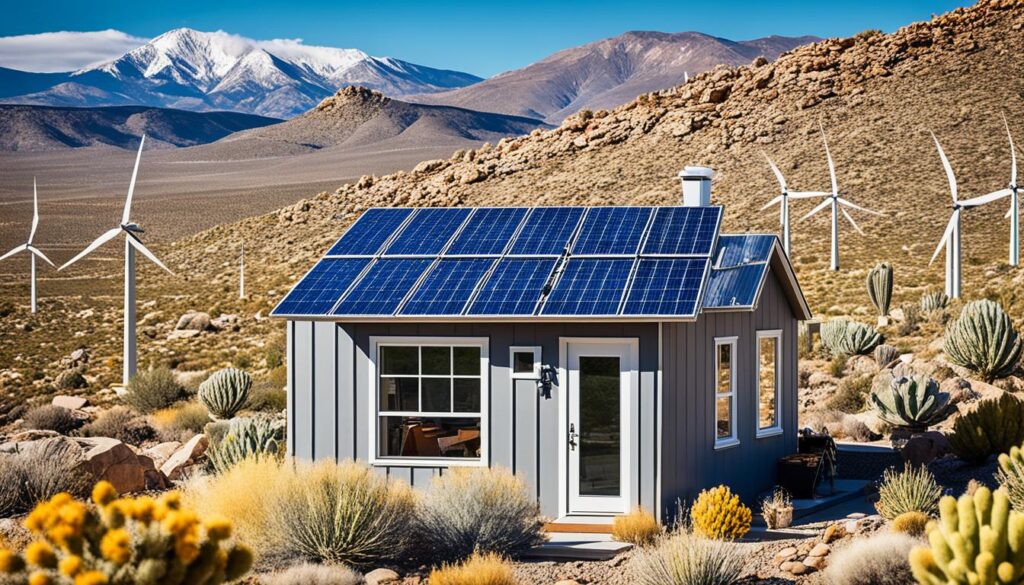
Benefits of Off-Grid Living in Nevada:
- Reduced reliance on public utilities and lower utility bills.
- Greater independence and self-sufficiency.
- Minimized environmental impact through renewable energy sources.
- Opportunity to live closer to nature and enjoy a quieter lifestyle.
- Ability to embrace sustainable practices and minimize waste.
Off-grid living in Nevada provides a unique opportunity to disconnect from traditional systems and embrace a more sustainable lifestyle. By implementing renewable energy solutions and utilizing eco-friendly practices, individuals can reduce their carbon footprint and promote self-sufficiency. It’s important to research and understand the specific regulations and requirements for off-grid living in the area you plan to reside.
Conclusion
In conclusion, Nevada offers a multitude of options for placing and living in a tiny house. Despite the regulations and zoning considerations, there are also exciting opportunities to join tiny home communities and embrace the benefits of sustainable living. It is crucial to conduct thorough research and diligently adhere to the specific regulations of each county or city in Nevada to ensure a successful and legal tiny house experience.
By carefully planning and following the laws, you can find the perfect location for your tiny home in Nevada, whether it’s nestled in a tiny house community or on a private property. The state’s commitment to incorporating small dwellings within zoning rules and the presence of various tiny house communities showcase the growing popularity and acceptance of this unique housing option.
So, if you’re ready to downsize, reduce your environmental impact, and experience the benefits of living in a tiny house, Nevada is a promising destination. Take the time to familiarize yourself with the regulations, connect with local authorities, and embrace the tiny house lifestyle in the Silver State.
FAQ
Where can I put a tiny house in Nevada?
Tiny houses can be placed in various locations in Nevada, including tiny house communities, RV parks, national parks, and private properties. Each county in Nevada has its own regulations, so it’s important to research the specific county where you plan to place your tiny house.
What are the zoning laws for tiny houses in Nevada?
Nevada has regulations and ordinances regarding the construction and placement of tiny houses. Each county has its own rules and regulations, so it’s important to research the specific county you are interested in. SB150 requires towns to modify their zoning rules to include small dwellings by 2024.
Are there any tiny house communities in Nevada?
Yes, Nevada is home to several tiny house communities, such as Llamalopolis Village and Dancing River Community. These communities offer a unique living experience and often have shared spaces and amenities for residents.
What should I consider when building a tiny house in Nevada?
When building a tiny house in Nevada, it’s important to consider the local building codes and regulations. Working with a reputable tiny house builder who understands the requirements is recommended. The construction and design should include proper insulation and a strong foundation.
Can I live in a tiny house permanently in Nevada?
Yes, it is possible to live in a tiny house permanently in Nevada. However, it’s important to comply with local laws and regulations. Contacting the zoning and local authorities can help ensure that your tiny house meets all the necessary requirements.
What are the benefits of tiny living in Nevada?
Living in a tiny house in Nevada allows for downsizing, reducing environmental impact, and affordable living. Tiny houses are designed to maximize space and offer opportunities for outdoor enthusiasts. Tiny house communities also promote sustainability and a stronger sense of community.
What zoning and legal considerations should I be aware of for tiny homes in Nevada?
Zoning and legal considerations are essential when building and living in a tiny home in Nevada. Each county has its own regulations, so it’s important to research and comply with the specific regulations of the county or city where you plan to build your tiny home.
What are the tiny home regulations in key Nevada counties?
Each county in Nevada has its own regulations regarding tiny homes. For example, Clark County has its own construction codes. It’s important to research the regulations for the specific county where you plan to build your tiny home to ensure compliance.
Are there any tiny home communities in Nevada?
Yes, Nevada is home to various tiny home communities, offering unique living experiences and amenities. Some popular communities include Tiny Town Estates near Las Vegas and sustainable communities that utilize eco-friendly technologies.
What building and design considerations should I keep in mind for tiny homes in Nevada?
When building a tiny home in Nevada, it’s important to consider the building codes and regulations specific to the state. Working with a reputable builder who understands these requirements is recommended. Proper insulation, a strong foundation, and efficient use of space are important considerations.
Is off-grid living and sustainability possible in Nevada?
Off-grid living is possible in some areas of Nevada, but there are regulations and restrictions to consider. Nevada has laws requiring connection to public utilities in many areas. However, in rural areas, there may be more flexibility regarding off-grid living. Sustainable practices can be implemented in tiny homes to reduce environmental impact.

